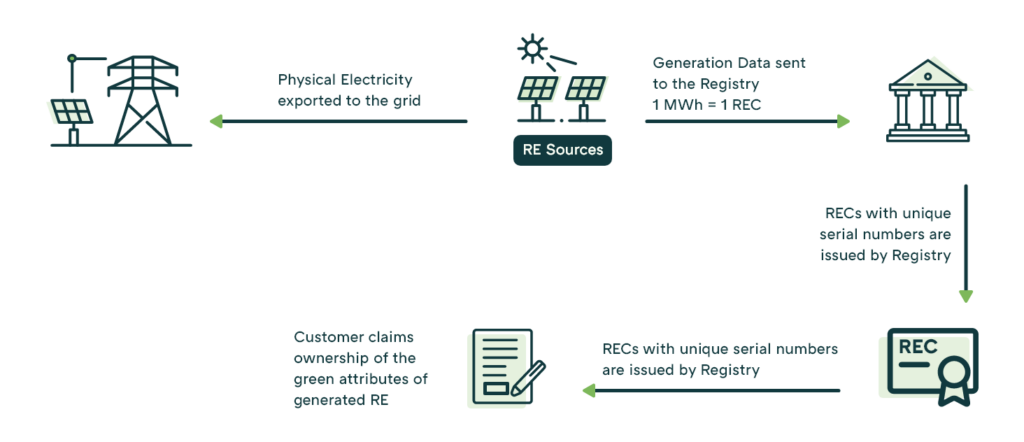RECs, or Renewable Energy Certificates, are tradable commodities in the environmental market, serving as evidence that a certain portion of electricity originated from renewable sources.
They’re also recognized under alternate titles like Green Tags, Renewable Energy Credits, or Tradable Renewable Certificates.
Each megawatt-hour (MWh) of electricity generated from a renewable source is certified and issued a REC, confirming its renewable and clean energy attributes. These certificates prove that a specific amount of electricity was generated from a renewable source.
Despite originating from the same source and time, Renewable Energy Certificates (RECs) and electricity represent distinct commodities functioning within separate markets. For instance, consider an industrial customer procuring 1,000 MWh annually from Utility A, sourced from coal and natural gas.
This situation differs from purchasing 1,000 RECs. Even if the customer isn’t directly generating clean energy or physically utilizing renewable energy, they can affirm that their operations are entirely fueled by 100% renewable energy.
Simultaneously, this practice supports the renewable energy ecosystem by funding the development of more clean energy projects, thereby bolstering the adoption of clean energy.
How Do RECs Work?

The diagram above demonstrates the process of RECs. It shows how RECs originate from the creation of renewable energy through various sources like solar, wind, hydroelectric, biomass, or geothermal power stations.
After the generation phase, the energy information undergoes validation to confirm specific details such as its origin, geographic location, and timing, resulting in the issuance of one REC for each megawatt-hour produced.
Once verified by registries like I-REC or TIGR, RECs receive unique serial numbers. Subsequently, the retirement process takes place, removing RECs from the monitoring system.
This action ensures transparency, prevents duplicate counting or excessive selling, and upholds the market’s credibility.
Benefits of RECs for asset owners & buyer
RECs bring advantages to various groups involved. They offer renewable energy producers’ extra revenue stream, aiding them in competing against fossil fuel generators and recouping their initial investment expenses.
On the other hand, consumers can use RECs to choose their power source and lower their environmental footprint without directly using it. Moreover, RECs promote the growth of renewable energy, cutting down on greenhouse gases, air pollution, and water use.
For Asset Owner
Renewable energy producers benefit from RECs as an extra revenue stream, enabling them to enhance competitiveness against fossil fuel generators and recoup their initial investment expenses
For Buyer
The acquisition of Renewable Energy Certificates (RECs) stands as an alternative enabling corporations and consumers to meet regulatory requirements while contributing to the development of a cleaner energy ecosystem.
RECs provide a means for buyers to fulfill renewable energy objectives without directly procuring physical renewable energy sources, aiding in achieving carbon neutrality and reducing overall environmental impact.
They offer buyers the opportunity to assert and demonstrate their commitment to clean energy and sustainability, simultaneously advocating for eco-friendly practices.
By endorsing clean energy sources, buyers may receive financial incentives or benefits, contingent upon local regulations or market conditions. These incentives can result in cost savings or other financial advantages for the buyers.
In essence, RECs function as a versatile tool empowering buyers to actively support renewable energy initiatives, attain sustainability targets, and align with environmental obligations or regulations.
Saxon Renewables
Saxon Renewables offers a variety of unbundled REC options tailored for corporate buyers, prioritizing meeting their needs while ensuring the most cost-efficient methods.
For many corporate buyers, particularly in Malaysia, venturing into procuring RECs, whether bundled or unbundled, is a new venture. Saxon Renewables is committed to assisting you throughout your journey in procuring renewable energy, from devising strategies to execution.
Numerous avenues exist to aid in fulfilling your renewable energy consumption goals, and Saxon Renewables stands as your steadfast sustainability partner for all your renewable energy requirements. Feel free to contact us for further details and guidance on your sustainability journey.




